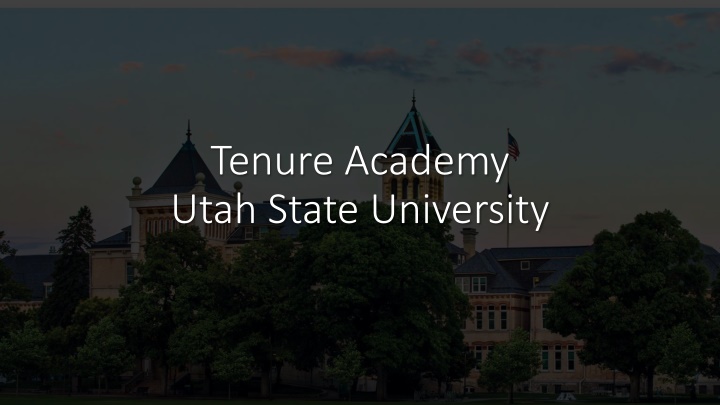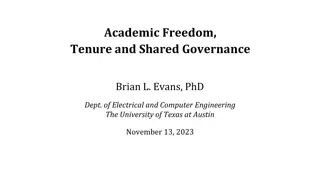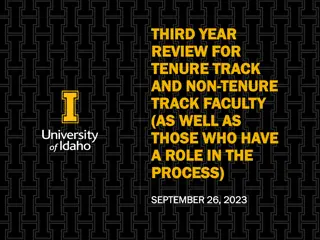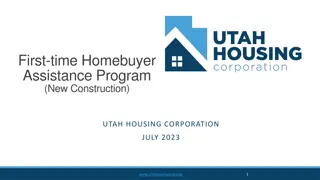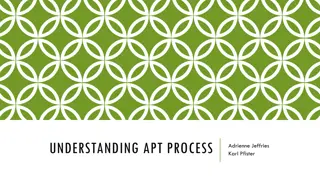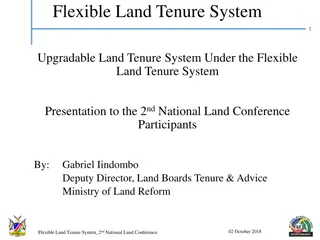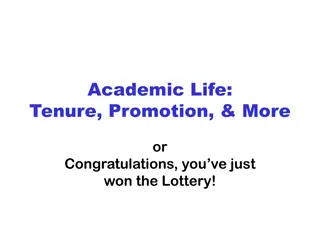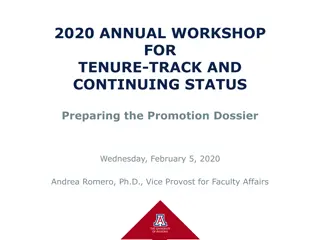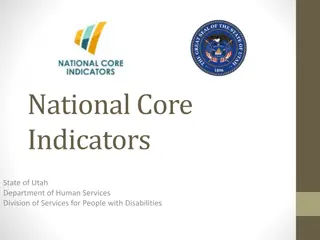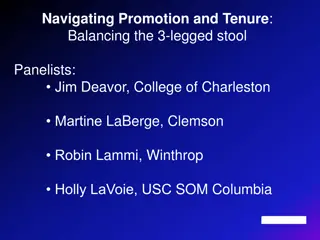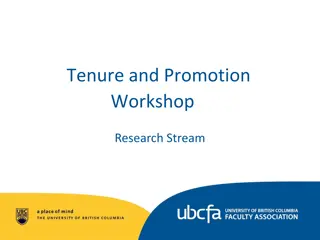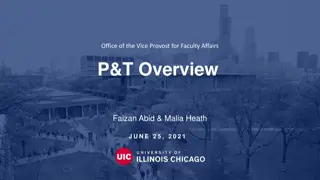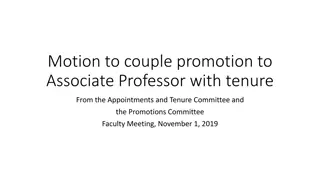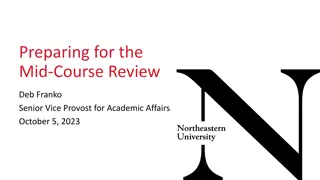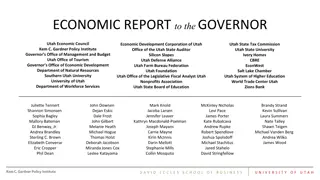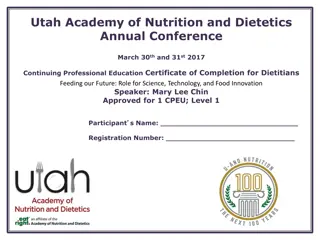Tenure Academy Utah State University
Tenure at Utah State University is a significant milestone achieved after a probationary period, recognizing outstanding faculty performance. This process involves annual meetings, faculty code adherence, and insights from Provost Smith. The university supports faculty members in pursuing tenure and offers opportunities for extension of the pre-tenure probationary period when needed.
Download Presentation

Please find below an Image/Link to download the presentation.
The content on the website is provided AS IS for your information and personal use only. It may not be sold, licensed, or shared on other websites without obtaining consent from the author.If you encounter any issues during the download, it is possible that the publisher has removed the file from their server.
You are allowed to download the files provided on this website for personal or commercial use, subject to the condition that they are used lawfully. All files are the property of their respective owners.
The content on the website is provided AS IS for your information and personal use only. It may not be sold, licensed, or shared on other websites without obtaining consent from the author.
E N D
Presentation Transcript
Tenure Academy Utah State University v
Outline Faculty Code Annual Meetings with Tenure Committee Tenure and Promotion Process Provost Smith Insight and Discussion
Tenure Tenure is that provision of employment attained after completion of a pre-tenure probationary period during which the probationer's performance is found to be such as to make them an asset to the institution because of their abilities as a scholar, a teacher, a researcher, a librarian, an extension faculty member, or a professional career and technical educator. It is the policy of the university to reward such outstanding performance of tenure-eligible faculty members by tenure and/or promotion. v
Timeline (4) Extension of Pre-tenure Probationary Period. Even if a leave of absence is not taken, at any time during the tenure process a tenure-eligible faculty member can request an extension of the pre-tenure probationary period for one year for reasons including, but not limited to, medical needs of the faculty member or a family member or family responsibilities (including birth of a child or adoption). This extension may be requested up to two times. Upon recommendation from the faculty member's department head or supervisor, and the academic dean or vice president for extension, and, where applicable, the chancellor or regional campus dean, the provost may approve an extension of the faculty member's pre-tenure probationary period. During the year in which the pre- tenure probationary period extension is granted, faculty responsibilities may be negotiated. When the faculty member that has extended the pre-tenure probationary period goes forward for tenure, expectations will be no greater than if the tenure extension had not been utilized. 1.4 Pre-tenure probationary period (1) Normal Period. The normal pre-tenure probationary period shall be six years. In general, the tenure-track faculty member is eligible for promotion and tenure review in the sixth year from the calendar year in which he or she is appointed. 1.4 Pre-tenure probationary period (2) Prior Service. At the time of appointment to a tenure-eligible position at USU, candidates who have served in a pre-tenure probationary appointment at another accredited university or college can negotiate with the department head or supervisor, the application of that prior service to the USU pre- tenure probationary period. The agreement must be specified in writing and approved by the department head or supervisor, academic dean and the provost.
Offer Letter Language While USU is committed to creating an environment in which all faculty members can succeed, probationary faculty members (specifically, assistant professors with tenure-eligible appointments) must demonstrate to their USU peers that they can manage the multiple responsibilities of a faculty member at a research university. Indeed, the Faculty Code states that a primary function of the role statement is to provide a means by which the faculty member can gauge his or her expenditure of time and energy relative to the various roles the faculty member is asked to perform in the University (Section 405.6.1).
Role Statement A role statement is a document that broadly describes the multiple responsibilities of a faculty member at USU and outlines the performance expectations that the University has of faculty members. The Faculty Code indicates that a role statement shall include percentages for each area of professional service (Section 405.6.1). The percentages reflect the relative weight or value that will be allocated to each professional service area when you are evaluated for tenure and promotion. You should carefully consider the amount of time you allocate to each area, as it is your responsibility to ensure that your efforts produce outcomes that are commensurate with the relative weights reflected in the role statement for each professional area.
Criteria Tenure and promotion from assistant to associate professor are awarded on the basis by which a faculty member performs their responsibilities as defined by the role statement. Each candidate must present evidence of effectiveness in all of the professional domains in which he or she performs, and must present evidence of excellence in the major emphasis of their role statement.
Role Statement (cont.) Can changes be made to the role statement of a pre-tenure probationary faculty member? Yes. In 405.6.1 is reads, The Faculty Code indicates that a role statement Any subsequent revision may be initiated by either the faculty member or the department head or supervisor. Any revision of the role statement should be mutually agreed to by the faculty member and department head or supervisor and approved by the academic dean or vice president for extension. If agreement cannot be reached, individual department, college, and/or University appeal or hearing procedures should be used to resolve disagreements before transmitting revised role statements to promotion advisory committee and tenure committees. At the time of the appointment a copy of the role statement, and any later revisions, will be provided to the faculty member, the department head or supervisor, the academic dean or vice president for extension and the provost and the members of the tenure and/or promotion advisory committee.
Tenure and Promotion Committee For each new tenure-eligible faculty member who is appointed, the faculty member's department head or supervisor shall, in consultation with the faculty member and with the approval of the academic dean or vice president for extension, and, where appropriate, the chancellor or regional campus dean, appoint a tenure advisory committee. A tenure advisory committee must be appointed during the faculty member's first semester of service. The committee shall consist of at least five members, one of whom must be from outside the academic unit 405.6.2(1). Versus Fall Annual Tenure Meeting 405.7.1 Annual Performance Review 405.12
Fall Annual Meeting with Tenure and Promotion Committee
visuaL aPProximation of the tenure & Promotion Process at utah state university PR E PAR ATIO N DE PAR TME NT HE AD SO LIC ITS E XTE R NAL PE E R R E VIE WS C ANDIDATE PR E PAR E S DO SSIE R R E VIEW TE NUR E ADVISO R Y C O MMITTE E O MBUDSPE R SO N R E C O MME NDATIO N It is the candidates responsibility for preparation and accuracy of his or her tenure and promotion dossier. DE PAR TME NT HE AD R E C O MME NDATIO N R E G IO NAL C AMPUS E XE CUTIVE DIR EC TO R (WHE R E APPR O PR IATE ) USU E ASTE R N C HANC E LLOR (WHE R E APPR O PR IATE ) DE AN R E C O MME NDATIO N Not all levels of review in the promotion and tenure process have to agree. C E NTR AL PR O MO TIO N & TE NUR E C O MMITTE E O MBUDSPE R SO N PR O VO ST R E C O MME NDATIO N PR E SIDE NT R E C O MME NDATIO N DEC ISIO N FINAL DE C ISIO N BY BO AR D O F TR USTE E S 6 USU PROMOTION & TENURE FREQUENTLY ASKED QUESTIONS | UTAH STATE UNIVERSITY 2014
What actions can a candidate take to What actions can a candidate take to ensure progress toward promotion and ensure progress toward promotion and tenure? tenure? Honest and forthright communication among the pre-tenure probationary faculty member and their tenure advisory committee and department head is critical to ensure that the faculty member understands their progress toward tenure and promotion. In addition to regular meetings with their tenure advisory committee and department head, it would be prudent for probationary faculty members to also meet at least annually with their dean, although this is not required by the faculty code. This is because the dean is responsible for renewing a probationary faculty member s annual contract and will ultimately make a recommendation regarding promotion and tenure.
Early Tenure While the faculty code contains no language that specifically addresses early consideration for promotion and tenure, there are provisions in the faculty code that allow a department head, dean, provost or president to recommend granting of tenure at a time other than the mandatory sixth-year tenure and promotion review. Having said that, early tenure and promotion does not occur very frequently and as one might expect, the case for this unusual action would need to be exceptional.
Tips for Preparing a Successful Promotion and Tenure Dossier https://www.usu .edu/provost/
Tips for Preparing a Successful Promotion and Tenure Dossier
Tips for Preparing a Successful Promotion and Tenure Dossier
